
Berlinale 2024. Politics on celluloid
Publié par Birgit Beumers - 7 mars 2024
Catégorie(s): Cinéma, Expositions / Festivals
Festivals seem to be impossible without political statements; but more and more often, it seems to be the political message that is awarded rather than the cinematic, artistic, aesthetic achievement – even if the latter, for sure, captures also a political view, or a civic position, in a work of art. This year’s Berlinale, the last curated by Carlo Chatrian and Mariette Rissenbeek, is another example where politics govern the arts, even if the festival always had a reputation for putting politics first. The main award went to a documentary, the second time in a row after Nicolas Philibert’s On the Adamant in 2023, this time made by a female director and a person of colour: Mati Diop. She took the Golden Bear from a jury presided over by Lupita Nyong'o for her film Dahomey that engages with the return of art objects taken by the French colonial powers during the late 19th and early 20th century. This constellation of person and topic alone checked more than one box of political correctness. Dahomey is only the second feature film by Diop, and it is short with a running time of 67 minutes – even if it feels almost too long, drawing out material better suited for a short film.
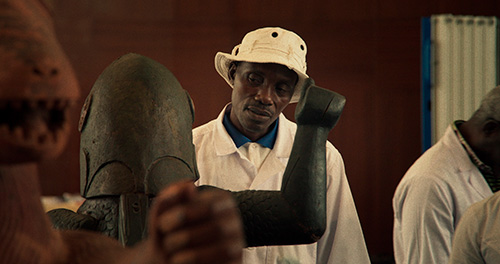
Another film with a “French connection” in competition that went on to receive an award – without gaining much critical acclaim, though – is Hong Sang-Soo’s A Traveler’s Needs (Yeohaengjaui pilyo) starring Isabelle Huppert. The film received the Grand Jury Prize, even though it had not much to offer in terms of narrative (Sang-Soo’s films rarely do…), as we fail to understand what exactly Huppert’s character is doing in Seoul, beyond drinking makgeolli and delivering some French lessons.
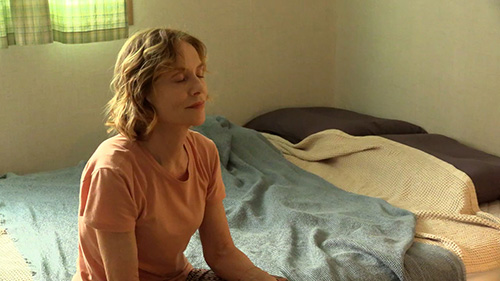
Civic courage
In its drive for political correctness on the gender issue, the Berlinale no longer offers a prize for best actress and best actor, but just one award for best performance, and one for best supporting performance, thus reducing the overall number of awards. The best performance award went to Sebastian Stan for his role in Aaron Schimberg’s A Different Man, while the best supporting performance was received most deservedly by Emily Watson, who played the Mother Superior in the opening film Small Things like These, which tells with visual means alone the story of Bill Furlong (played by Cillian Murphy, showered with awards for his performance in Oppenheimer at the BAFTA awards that took place during the same week). Bill reveals extraordinary civic courage when he rescues a young girl from the Magdalene sisters’ convent, where he discovers her while delivering coal. Murphy’s Bill has few words: he observes the nuns hiding away pregnant teenage girls who would otherwise shame their families in Ireland of 1985. The work of the Magdalene Sisters has been exposed in cinema by Peter Mullan’s The Magdalane Sisters (2002), and also in Stephen Frears’ Philomena (2013), yet Tim Mielants’ film based on Claire Keegan’s novel ties in to the story of the convent that of Bill himself, the child of a single mum who was lucky enough to have been protected by the generous Mrs Wilson, who had no children of her own. Now married with four daughters, Bill is a hard-working owner of a coal delivery business, who treats his workers with a good deal of concern. And he will do the same when he brings home the girl from the convent on Christmas day, whose baby has been taken away for adoption and who wants be taken to the river –to die. The story highlights the deplorable role of religious orders for society, as the nuns make people fear repercussions for their civic courage: the church in Ireland of the 1980s controlled access to education and to social care – and Furlong risks all that in order to pay back what Mrs Wilson did for his mother. That is also a political statement about civic courage and what it takes to rebel against imposed rules and regulations, challenging their meaningfulness.
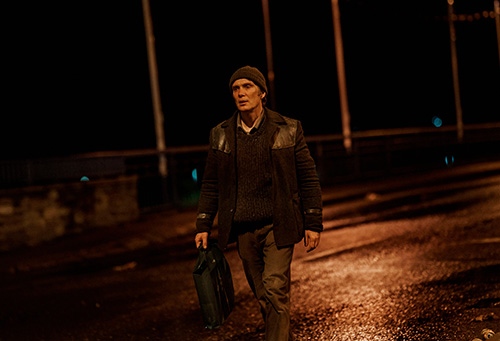
A display of civic courage is a theme that could be found in several competition films, including the German biopic From Hilde, with Love by Andreas Dresen, about the courage of Hilde Coppi, who helps her husband Hans, involved in the resistance group ‘Rote Kapelle’ that fights against the Nazis, and who pays with her life. Although this is a rather traditionally told story, it draws the viewer into Hilde’s dilemma to act – not just because of a political conviction, but because of love and trust to her husband.
Generational shifts, en français
A recurrent theme in the Berlinale competition was the shift of generations – parents and children, of course, but also the “expiring” (retiring) generation of the Baby Boomers and Generation X (1960s) and Generation Z (the “Zoomers” of the 2000s). This shift is portrayed with a great deal of humour in Bruno Dumont’s Empire, which nevertheless divided the critics. Dumont delves into the science-fiction genre (references to Star Wars abound) and creates a story of warfare between two clans, two planets – or maybe two generations, one represented by a spaceship and the other governed from an underwater world, one modelled on Star Wars (the generation of the future) and the other on the past cultural heritage, modelled with architectural allusions from Versailles to Sainte-Chapelle, where the historical and sci-fi settings echo the predilections of the clan members of the groups “0” and the “1”, marking a generation gap. Gen Z tries to take over the world, in this case a small French township on the Atlantic. With acute sharpness and wit, Dumont portrays this battle where each character is created through a splendid performance by mostly unprofessional actors. The film received the Silver Bear Jury Prize.

Another French film in competition was Claire Burger’s Langue étrangère, which also focused on the young generation, and specifically the impact of family problems on children. In a school correspondence scheme between Germany and France, Leipzig and Strasbourg, two teenage girls make friends. They both struggle with different problems at their parental homes – a mother recovering from divorce and a father with an illegitimate daughter – and at school. Even if the lesbian turn at the end is rather unconvincing and unnecessary, the film raises important issues of growing-up, of mobbing, of the psychological impact of parents’ conflicts. The generational gap is foregrounded and problems of not fitting together and not fitting in are focused in the character formation of the teenage girls.
Death
The theme of death, and of closure, appeared prominently in a number of competition films. Above all, it featured in the Iranian film My Favourite Cake by Maryam Moghaddam and Behtash Sanaeeha, who were not allowed to attend the festival. The film thus offers another narrative of resistance, by filmmakers who were denied permission to leave Iran. The film focuses on a widow, who plucks up the courage to address a man in her attempt to find a new meaning in her life. However, her joy is short-lived. The film shows with great humour a situation that is utterly tragic, namely the isolation of women reinforced through social and moral laws.
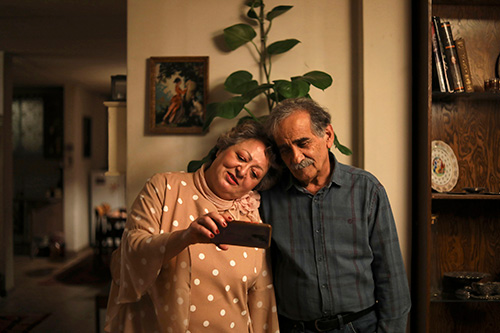
The theme of death also dominated the Italian film Another End, by Piero Messian, starring Mexican actor Gael Garcia Bernal and Norwegian actress Renate Reinsve. The film highlights the inability of people to part with loved ones after their death, and the wish to bring them back to life rather than face up to loss. The complexity of self-deceit lies at the core of this partially sci-fi plot, whereby ‘donors’ can assume the consciousness of the dead for medical reasons and return to the loved ones to heal the trauma of loss. Similarly, in Matthias Glasner’s Dying/Sterben, a three-hour film that received the award for best screenplay, death stands at the centre of five acts. Lars Eidinger plays Tom, a conductor whose family has fallen apart: the mother could not cope with Tom as a child, Tom is traumatised by this neglect, his father suffers from dementia and is moved into a home, his sister has an alcohol addiction in which she drowns her failure to cope with her childhood, and Tom fails to have a family with the woman he loves, but has a friendship with a composer who demands of him an act of love: assisted suicide. The film touches on different stories of lives affected by death of close people, but ultimately challenges the understanding of dying as a part of life.
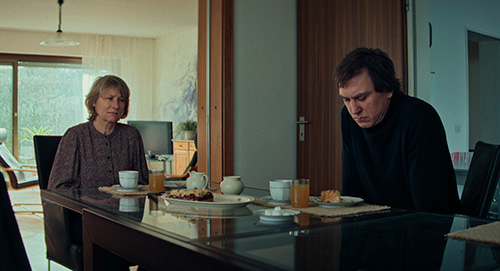
On the Screen critics’ grid, leading along with My Favourite Cake with a score of 3.1/4.0 stood The Devil’s Bath by Austrian filmmakers Veronika Franz & Severin Fiala and produced by Ulrich Seidl. This film deals with the topic of ritual murder in the 1750s in Upper Austria. Starring the musician Anja Plaschg (Soap&Skin) in a superb performance as a young and profoundly religious woman, Agnes, the film begins with her marriage to the ‘stranger’ Wolf (played by comedian David Scheid), who lives in another village. Wolf shows little interest in her (and in women in general), so she does not have any children, as she would have liked and as is expected by her mother-in-law. Unable to fit in to the new life, she tries to work things out but then she runs away. Unable to return home, she gets more and more locked up in her own world. Unable to find a cure for the melancholia associated with her increasing withdrawal from the world, she suffers and undergoes a cruel pain therapy. Her life becomes hell. For woman in those times, suicide was no option; instead, there are over 500 recorded cases in Austria alone, of women committing murders so they would be sentenced and executed – and die a less shameful death than suicide. The film’s story was inspired by research carried out by American scholar Kathy Stuart, published as Suicide by Proxy, about trials of women who murdered to die a ‘proper’ death. The film raises another, and maybe even more powerful, side of the concern with social and religious laws that regulate human behaviour and cripple people – as seen in Small Things…, and that might lead to violence.
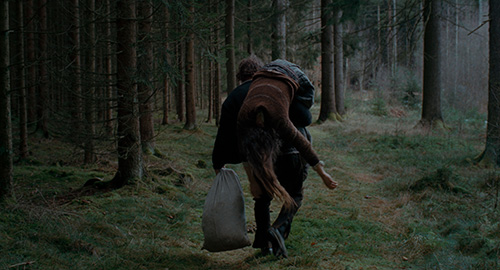
Such a strong political statement does not just show an accomplished act of “decolonising” history by ripping out pages from it, but challenges un-narrated histories, maybe bringing to the surface those pages we would have to think about – but that is so much more uncomfortable than cheering another act of cancelling our past so we may forget about those horrific times and take them out of history books. The Devil’s Bath is definitely an eye-opener, both in terms of unturned pages of women’s history, and in terms of powerful visuals that create cinema. With a capital C.
